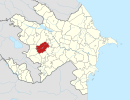Garnakar, Nagorno-Karabakh
History
During the Soviet period, the village was part of the Mardakert District of the Nagorno-Karabakh Autonomous Oblast.
Historical heritage sites
Historical heritage sites in and around the village include the 9th-century Hamami Church (Armenian: Համամի եկեղեցի, romanized: Hamami Yekeghetsi), the church of Hangats (Armenian: Հանգած) from between the 11th and 13th centuries, the fortress of Natarin (Armenian: Նատարին) or Ded (Armenian: Դեդ), the church of Mughdusi (Armenian: Մուղդուսի), two villages – one of them named Hamami Dzor (Armenian: Համամի ձոր), a cemetery and khachkars from between the 12th and the 13th centuries, the Mughdusi Cave, and an 18th/19th-century cemetery.
Economy and culture
The population is mainly engaged in agriculture and animal husbandry. As of 2015, the village has a municipal building, a school, two shops, and a medical centre.
Demographics
The village had 124 inhabitants in 2005, and 161 inhabitants in 2015.
References
- ^ Hakob Ghahramanyan. "Directory of socio-economic characteristics of NKR administrative-territorial units (2015)".
- ^ Андрей Зубов. "Андрей Зубов. Карабах: Мир и Война". drugoivzgliad.com.
- ^ Sauer, Pjotr (2 October 2023). "'It's a ghost town': UN arrives in Nagorno-Karabakh to find ethnic Armenians have fled". The Guardian. ISSN 0261-3077. Retrieved 9 November 2023.
- ^ "The Results of the 2005 Census of the Nagorno-Karabakh Republic" (PDF). National Statistic Service of the Republic of Artsakh.
External links

